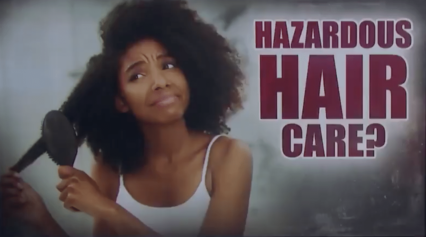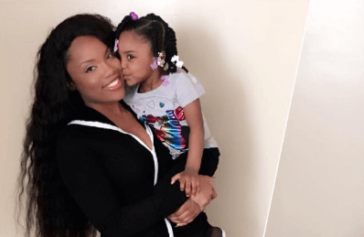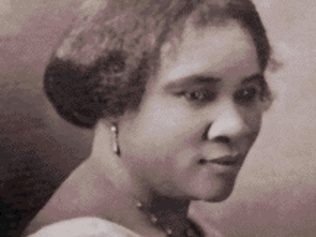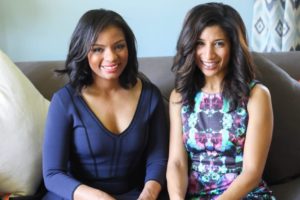
Stephanie Belcher (left) and Debra Shigley met through Belcher’s sister, who is Shigley’s longtime friend. (Fennella Miller)
If you’re a resident of the Greater Atlanta area who has ever wanted an alternative to waiting for hours in the hair salon, the Colour in-home hair-styling app is for you.
Founded by Debra Shigley and Stephanie Belcher in 2016, the company has become a huge hit thanks to word of mouth from clients and stylists alike. Serving the metro area with pockets in Stone Mountain, College Park and Smyrna, Ga., this innovative app has been known to send stylists to homes beyond its 7 a.m.-8:30 p.m. business hours. In an exclusive Q&A, Shigley and Belcher reveal the inside scoop on Colour, which can be downloaded for the iPhone on the App Store, and why there’s room for heatless and blow-dried straight styles in the natural hair space.
What is the problem with the long wait times at traditional salons? How is the process at Colour different?
Shigley: There are lots of bottlenecks in the traditional salon experience that are eliminated by our service. One of them would be hair washing. We do have many clients who like us to wash their hair now that we’ve added that onto our secret menu. But that’s one piece of it that would start the bottleneck. Another thing is that most of our stylist have a one-seat mentality. Basically, we don’t believe in hooded dryers, so you’re with a stylist from start to finish. So, you’re at the house [and] if you’re doing the blowout, you’re starting on wet hair. Our stylist is working the entire time. There’s no downtime. In the modern era, you can process the hair into a style and everybody’s on their way and you can air dry on your own time.
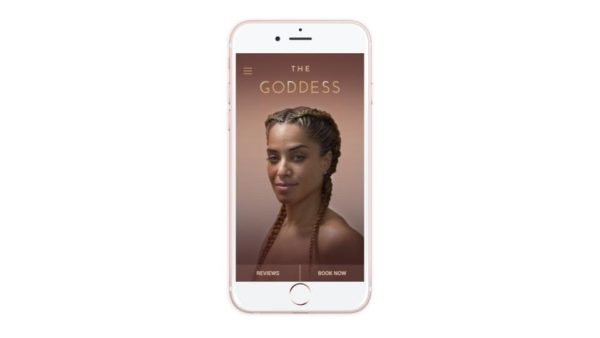
Goddess braids are among the most-popular styles at Colour. (Colour App)
What are the most popular hairstyles clients request?
Shigley: Probably the most popular all-around is just blow dried straight. [We call it] “The Luxe.” It’s blow dried straight with curls. That’s sort of like the classic full, bouncy, blow-dried look. Flat twists have been the look of the summer in different ways. We’re having a moment in Black hair — Issa Rae on “Insecure” is driving a lot of trends and awareness, so we sort of consider her our muse for a lot of different clients. Of course, summertime goddess braids in various different custom variations. We have a couple signature looks: One is the lady braid that Ciara did on the red carpet some time ago. That one is a double halo braid that starts as a traditional braid and then the braids transition to a fishtail braid and then it wraps around the head in a double halo. People really like it for weddings, corporate as well.
How does Colour remedy issues with a final hairstyle?
Belcher: Our customer service is the biggest piece of this to make it all work. Many of the times when a customer is not loving her hair in the way that she thought she would, more than likely it’s a miscommunication between [the way the] client speaks and stylist speaks. We help to negate those things more often than not so those that slip through, we handle and make right. We have a “Great Hair Guarantee,” so if you’re not in love with your hair, we will re-do [the same style for free according to your schedule].
What is Colour’s stance on weave?
Shigley: We have [done weaves] for select clients in the past, [but the] answer is ‘no.’ We’ve debated it. Our initial reason was purely business reasons but over the past year, I think the essay [on weave and alopecia] I wrote was more about uncovering an issue we never knew existed and that was this growing, arguably epidemic amongst Black women. We’re not anti-weave as a company, we’re anti-baldness and I think that’s really what it comes down to. [As a mom] I think about if my daughter started a hair practice in their teens and that practice was clinically shown to cause hair loss, would I encourage that? Would I want her to do that?
Shigley: We’re very pleased excited to announce the reviews feature, which we’re the first [app of our kind to do so]. We realized early on how important that was because we were gathering feedback from our clients from each and every appointment.
Learn More About Hair Innovations In Black Hair Care
- Spelman Grad Develops Hair Care Line Specifically Designed to Treat Scalp Ailments
- Black Hair Care Experts Share Insight on How African-Americans Can Gain Control of Black Hair Industry
- How One Businesswoman Is Promoting Black Hair Health
What makes Colour different from other at-home hair care apps for women of color?
Shigley: Our focus has been more on the holistic approach whereas others [have] a curated recommendation [of styles]. What we learned early on is that to really solve the problem of Black hair and all the issues we face with Black women, you have to actually do Black hair. And it is a revolution in terms of our understanding of the top-to-bottom troubles we’ve had in terms of both customer service elements, the on-trend styling, helping to contribute to educating stylists, making it the most convenient way possible and bringing that all together. So, that’s how we’re different. How can we get to a place where Black women never have to think about their hair again? The vision is: what is the white-privilege version of hair?
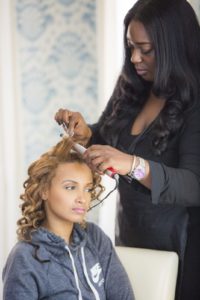
Stylists like Colour artist Kenya Wade participated in events to train them for their job. (Emily Ramsier)
How has your business grown since launching in May 2016?
Shigley: I think we’ve grown, definitely from real clients telling others. We’ve been lucky to get early press. I think the idea is one that … the time has come [for it] in the sense of Black women can kind of collectively talk about Black salon problems. We’ve done a lot of interesting events [for groups like the Georgia Association of Black Women Attorneys, The Steve & Marjorie Harvey Foundation’s Girls Who Rule The World Mentoring Camp and Jack and Jill of America] and it’s grown organically.
What’s the biggest success you’ve had?
Shigley: Our customer service rating on the positive reviews of our clients. That’s been huge — both for our clients and our stylists, so we’re super proud of that. I think that’s the foundation for everything that follows.
What failures have you had?
Shingley: I would say probably the worst-case scenario is a Black woman with wet hair and no stylist at her door. And having had that happen a few times, it basically came down to, ‘What communications [and] notifications need to happen to ensure that that type of scenario happens as minimally as possible?’ “Never” is obviously the goal. But if it does happen, what are the checks and balances in place to ensure we avoid that? We’ve learned from [things like that] and we are able to build that into our operation to tighten it up going forward.

Robin Wright as Claire in “House of Cards” and Tracee Ellis Ross as Bow in “black-ish” have inspired how the Colour founders style their hair. (Netflix/ABC)
Do you have any hair inspirations?
Belcher: Claire [played by Robin Wright] from “House of Cards.” She’s a boss, but her hair is the perfect undone-but-done style. The Mona Cut [on Instagram] out of New York is one more of the natural styles that I am awed by.
Shigley: Tracee Ellis Ross. I think she has a beautiful variety with her hair and tries so many different things and I love what they’re doing also on “black-ish” [by] showing different ways of wearing styles. This is a new thing we’re seeing where Black women have their actual hair in a different style over the course of the show. That’s one of the first things I noticed about Issa Rae’s show — and it’s big. Beyoncé’s always gonna be up there in terms of just freedom. Beyoncé can do no wrong with hair, be it “Lemonade” braids, whatever it might be, we’re always gonna be influenced by her. Rihanna’s a big inspiration, as well.
